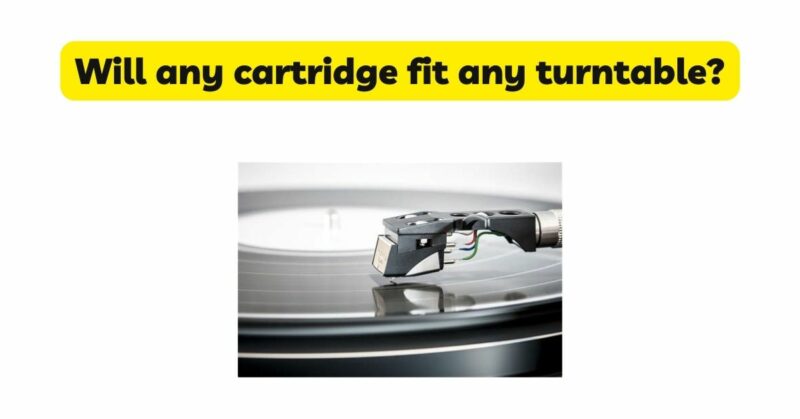Turntables are intricate audio devices that require precise alignment and compatibility between various components to achieve optimal performance. One crucial component is the cartridge, which houses the needle/stylus responsible for tracking the record grooves. When it comes to cartridge selection, it is essential to consider compatibility with your specific turntable. While there are universal and interchangeable cartridges available, it is not accurate to assume that any cartridge will fit any turntable. In this article, we will explore the concept of cartridge compatibility, discussing the factors that determine whether a cartridge will fit a turntable and providing guidance on selecting the right cartridge for your setup.
- Turntable Tonearm Design: The tonearm is the part of the turntable that holds the cartridge and facilitates the movement of the needle across the record surface. Different turntables employ various tonearm designs, and the compatibility between the tonearm and cartridge is critical. Key considerations include:
a. Mounting Style: Turntables use different mounting styles for cartridges, such as standard mount, P-mount (T4P), and T-mount. Each mounting style requires a specific type of cartridge with the corresponding mounting mechanism. For example, a turntable with a standard mount tonearm will require a standard mount cartridge.
b. Tonearm Mass and Compliance: Turntable tonearms have specific mass and compliance requirements. The mass refers to the weight of the tonearm, while compliance relates to its ability to absorb vibrations and move in response to the record grooves. These factors can affect the compatibility and performance of the cartridge. Some turntables are designed for high-compliance cartridges, while others are suited for low-compliance cartridges. Matching the cartridge compliance with the tonearm design is crucial for optimal performance.
- Cartridge Compatibility: Cartridge compatibility extends beyond the physical fitment and also includes electrical and performance aspects. Consider the following factors:
a. Electrical Output: Cartridges have different electrical output levels, which can affect the compatibility with the turntable’s phono stage or preamplifier. It is important to match the cartridge’s output with the input requirements of your audio system to ensure proper signal amplification and accurate sound reproduction.
b. Tonearm Wiring: Some turntables have integrated tonearm wiring, which connects the cartridge to the turntable’s internal electronics. In such cases, the cartridge must have compatible connectors or be adaptable to the specific wiring configuration of the turntable.
c. Tracking Force and Anti-Skate: Turntables have mechanisms to adjust the tracking force and anti-skate, which help the stylus maintain proper contact with the record grooves. Cartridges should allow for easy adjustment of tracking force to ensure optimal performance and prevent excessive record wear.
d. Cartridge Weight and Balance: Cartridges have different weights, and it is crucial to consider the balance and weight capacity of your turntable’s tonearm. An improperly balanced cartridge can cause tracking issues, increased record wear, and potential damage to the stylus and records.
- Universal and Interchangeable Cartridges: Universal cartridges are designed to fit a wide range of turntables and offer greater compatibility. They often feature adjustable mounting mechanisms or adapters to accommodate different tonearm types and mounting styles. These cartridges aim to simplify the selection process by providing a versatile option that works with various turntables. However, it is important to note that while universal cartridges offer broad compatibility, they may not provide the same level of performance as specialized cartridges designed specifically for your turntable model.
- Manufacturer Recommendations and Compatibility Lists: To ensure optimal compatibility, it is advisable to consult the manufacturer’s recommendations for your turntable model. Manufacturers often provide guidelines and compatibility lists that specify compatible cartridge models or provide guidelines for selecting the right cartridge. This information takes into account factors such as tonearm design, mounting style, and electrical requirements. Following the manufacturer’s recommendations can help ensure proper cartridge selection and compatibility.
- Seek Professional Advice: If you are uncertain about cartridge compatibility or need further guidance, consider seeking advice from audio equipment specialists or consulting with reputable retailers. They can provide expertise and recommend suitable cartridge options based on your specific turntable setup and preferences.
Conclusion: Cartridge compatibility is a crucial aspect of turntable setup and directly impacts the performance and sound quality of your vinyl playback. While there are universal and interchangeable cartridges available, it is not accurate to assume that any cartridge will fit any turntable. Factors such as tonearm design, mounting style, electrical compatibility, tracking force, and cartridge weight must be considered when selecting a cartridge for your turntable. Universal cartridges offer broad compatibility, but specialized cartridges designed for your specific turntable model may offer superior performance. Consult the manufacturer’s recommendations, seek professional advice when needed, and ensure proper compatibility to achieve optimal sound reproduction and maximize the potential of your turntable setup.


